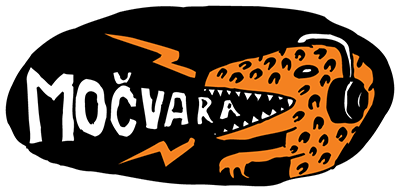Descartes a Kant borrowed their name from the great thinkers, but their music is anything but academic. It’s raw, theatrical, and gloriously unpredictable. We talked with the band about building meaning out of chaos, escaping genre, and why every record is its own philosophical experiment. They’re coming to Močvara 31.7. to give you a taste.
Your band name pulls from Descartes and Kant — logic, structure, philosophy… but your sound is pure chaos in the best possible way. What does that contrast represent in the context of your (really great) music?
Great question! To me life is about making sense out of chaos, and philosophy itself is pretty much about making all the questions as possible about the meaning of life – We are uncertainty searching for certainty. So I guess our music in sound and structure represents that, trying to go through all the colors, from black to white, from the sweetest to the hardest, from Descartes to Kant.
After everything — all the touring, scene shifts, and years navigating both the underground and international circuits — what’s the one thing you’ve never compromised on in your art?
Fortunately we’ve never ever had to compromise anything in our art, on the contrary we learn as much as we can about the diversity in music, all types of music scenes and all the different cultures we get to cross our paths with. It’s amazing to be able to go around the world presenting our crazy art.
Was there a specific show, band, or moment in the Mexican scene early on where you thought, “Okay, this is real — we can actually do this”?
After we released our album debut Paper Dolls, like in the same year we opened for the Yeah Yeah Yeahs, for Sonic Youth and also we played at our first massive festival ‘Vive Latino’ – which is the hugest in Latinoamérica, in that year we felt that something was happening and that we had something special going on, that the people was starting to know about us and be receptive to this kind of music, and we started to take it seriously in a way.
You’ve talked before about feeling like outsiders in the Mexican scene. Has that outsider status turned into a kind of creative freedom over time? Or does it still feel like you’re carving out space where there wasn’t any?
Yeah not fitting in a genre or a specific scene gives us all of the freedom to experiment and push our own artistic limits without feeling that our audience has an expectation about us, and that has always been what this band is about, the anti genre and not fitting in a box.
Every one of your records feels like a total reinvention — from Paper Dolls to Victims of Love Propaganda, it’s like stepping into a new world each time. What pushes you to change things up from album to album?
Yeah totally, that’s like our thing, each album is like its own universe and it’s so hard and challenging to do that every few years, but it’s also what makes it super exciting, you can never get bored or too comfortable.
What’s the weirdest, most unexpected thing that’s ever sparked a song for you? Like, a dream, experience, a conversation, a smell… anything.
There was one conversation we had during a breakfast several years ago, I was talking about how cool would it be to see a tap dance solo in a punk venue, like those two different contexts converging, and that’s when I started to write ‘You May Kiss The Bride’, which is a personal wish of singing in a musical, made reality!
“No es por ti, es por mí” stands out since it’s fully in Spanish — which you don’t always do. Does something shift in your performance when you switch languages? Is there something you can say or feel in Spanish that just doesn’t come across the same in English?
Yeah, switching languages is like having a dual processor in your mind, not everything translates precisely, but at the same time all my life has been about switching between those two languages intermittently. I grew up in California and then moved to Mexico when I was a kid, so this language shift has occurred ever since. And when you are writing music, it challenges you in a very particular way. It’s rare nowadays to hear a Mexican band sing in English, but at the same time I always viewed DAK as an intentional project, so it had made more sense through time since we have been touring more and more out of our country. I’ve realized that in the end the audience connects with the music, the performance and the art language in a broad and more immediate and intimate way, despite the lyric language our songs have been written in. Touring this album among live audiences in different countries has been incredibly fun to experiment.
If you could play one stage — any stage in the world — where do you think Descartes a Kant belongs? Like, what’s the dream venue or festival that just makes sense for your universe?
We are dying to go to Asia, it’s like our dream, and everyone says we would make so much sense there. I wish we could play at the Fuji festival someday.
You’ve mentioned how tech connects and isolates us at the same time. Do you think music still brings people together in a meaningful way — or is that kind of connection harder to come by now?
Music and art definitely bring people together in many ways, whether you are creating it or experiencing it as an audience. Hopefully in a meaningful way! In our case, every time we play a show or do an album it’s very meaningful.
What is your favorite performance so far and why?
Probably when we played in Russia because it’s such a different place and we didn’t know what to expect at all, and was probably the most effusive reaction from a crowd we’ve ever had! And there were people from all ages.
Anita Ulovec (Volontiram u Močvari)




























